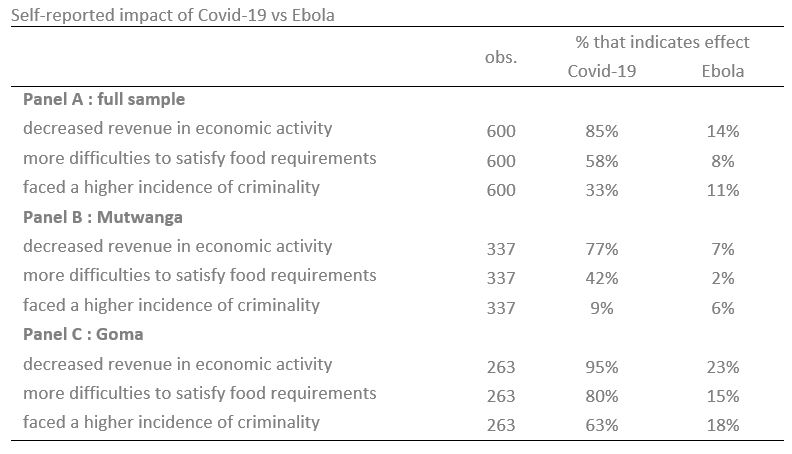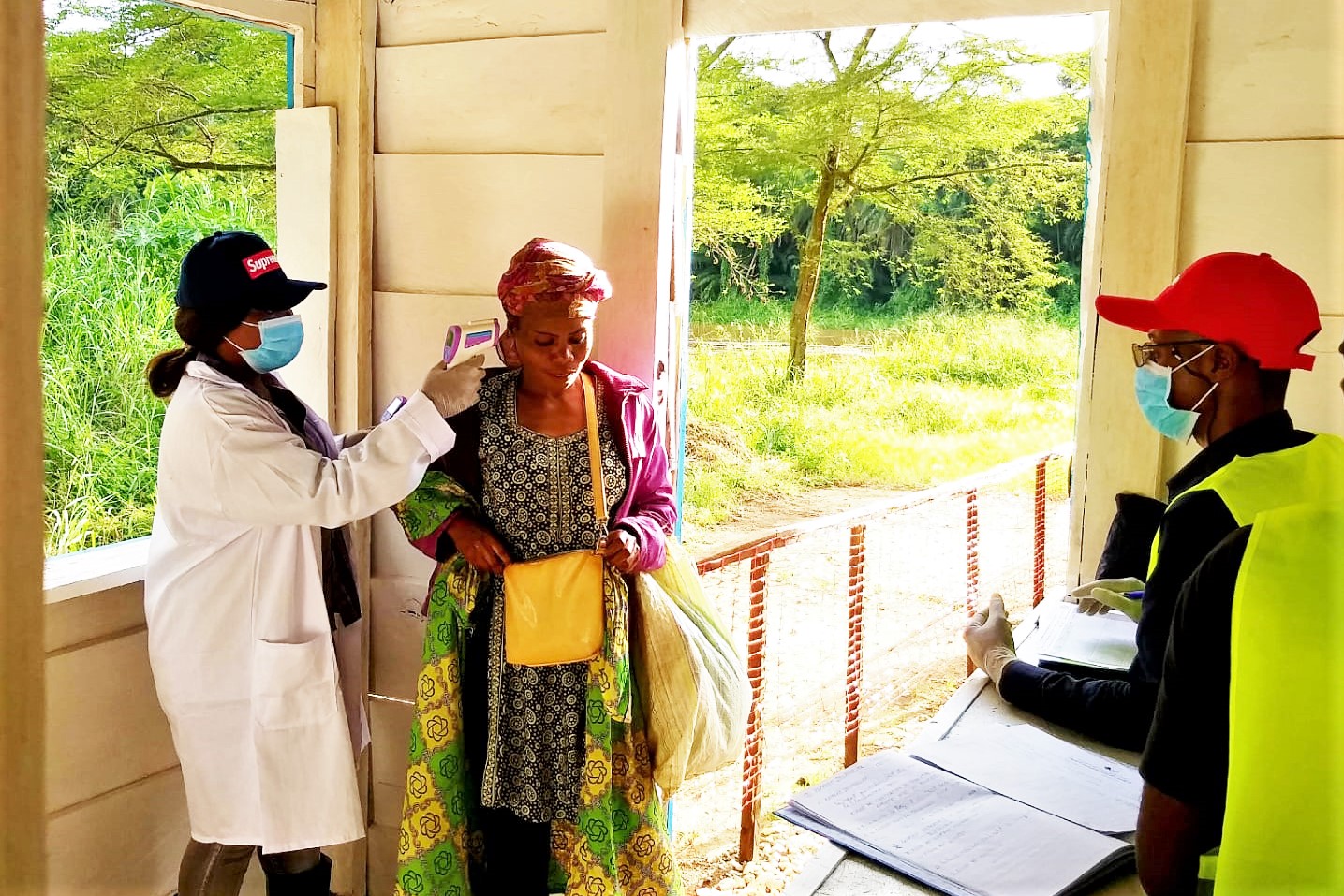Read this blog in French here.
As the world is trying to contain the current outbreak of Covid-19, the Democratic Republic of Congo (DRC) faces the additional challenge of simultaneously tackling another zoonosis: the Ebola Virus Disease. We conducted a survey with respondents from the megacity Goma and the rural commune of Mutwanga to study the socioeconomic impact of these two outbreaks in the province of Nord Kivu, and find much larger effects of Covid-19 on revenues, access to food and behaviour. Besides the immediate socioeconomic effects, there will likely be severe long-term effects, potentially prolonging and intensifying instability in the region. Our findings illustrate that moderately virulent but highly transmissible viruses can trigger a steep economic downturn, especially in areas with high economic interconnectedness.
Socioeconomic impact inverse to disease case numbers
Although the morbidity and mortality of Ebola in Nord Kivu far exceeded that of Covid-19 at the time of our survey , we found that Covid-19 had on average a much stronger impact on livelihoods. While 85% of our respondents report a decreased revenue due to Covid-19, only 14% indicates that Ebola had such an effect. Moreover, 58% of respondents reports that Covid-19 had affected their food security, while for Ebola this was only the case for 8%. One third of respondents further link Covid-19 to a higher incidence of criminality, while only 11% report such an effect for Ebola.

Zoonosis’ impact higher in interconnected megacity
It is further interesting to note that – whether talking about revenue, food security or crime – the share of respondents that reports an impact of either Covid-19 or Ebola is higher in the megacity of Goma than in Mutwanga, a rural commune located close to the epicentre of the country’s tenth Ebola outbreak. This likely relates to the drastic lockdown measures that were introduced in densely populated urban areas. It also reflects the city’s economic interconnectedness, in terms of cross-border trade with neighboring Rwanda and its own vibrant service sector. We find that 32% of our SME sample in Goma fired employees because of Covid-19, and 13% suspended their activities altogether. Small shops, restaurants and bars were, unsurprisingly, most affected.
High transmissibility explains why Covid-19’s impact trumps Ebola’s impact
There are many virological differences between Ebola and Covid-19, but transmissibility is the most important one from an economic cost perspective. Covid-19 spreads through respiratory droplets and has many asymptomatic cases, allowing its human host to freely spread the virus. Ebola spreads through contact with body fluids and has very little pre-symptomatic infectiousness, often killing its human host before many others can be infected. Because of Ebola’s moderate transmissibility and the targeted response efforts taken by the population and the authorities, the 2018-20 outbreak could be contained to a limited geographic area without introducing lockdowns or closing borders. In contrast, Covid-19 quickly evolved into a pandemic in spite of lockdowns and border closings. The drastic containment policies triggered an immediate negative economic impact in Nord Kivu. The global economic slow-down further exacerbated the impact through economic interconnectedness, leading to a decrease in the demand for and prices of minerals – the primary export goods of DRC, and an increase in the price of basic necessities.
Long term implications
Simulations of the Covid-19 impact find DR Congo to be among the three countries most at risk for worsening food insecurity, and with the largest estimated increase in the number of poor. Our findings corroborate these gloomy predictions. Besides the immediate socioeconomic cost that we observe today, there will likely be severe persistent effects of school dropouts, lower food intake during early childhood, interrupted vaccination campaigns, and most likely also of a slow recovery in revenues from remittances and resource exports. In addition, and as already suggested by our findings on the self-reported incidence of criminality, by fuelling the ranks of the un(der)employed, the Covid-19 crisis could further prolong and intensify instability in the region.
Two research locations, two zoonoses
In May 2020 we conducted 600 phone interviews with households and small firms in two locations in Nord Kivu: in Goma, a megacity just at the border with neighbouring Rwanda, and in Mutwanga, a rural commune located close to the epicentre of the country’s tenth Ebola outbreak. The Ebola outbreak was declared in August 2018, and had caused 3,462 cases and 2,279 deaths by the end of May 2020. Covid-19 was first detected in Nord Kivu on March 31, 2020, and two months later 43 Covid-19 cases were confirmed in the province, mainly in Goma.

Full working paper available
Download the full working paper from the IOB Research website.



[…] Lisez ce blog en anglais ici. […]